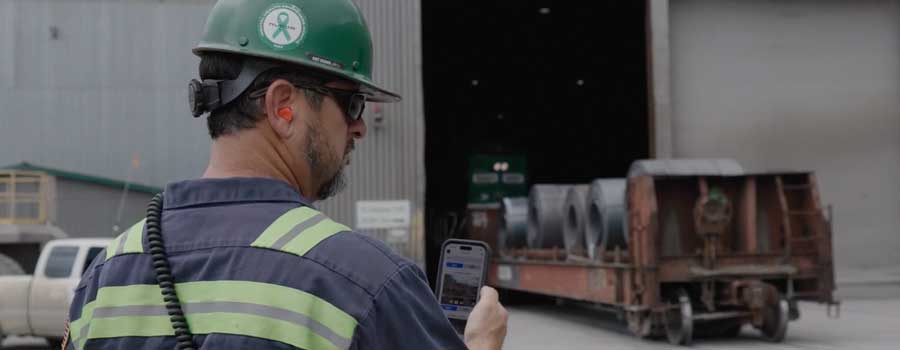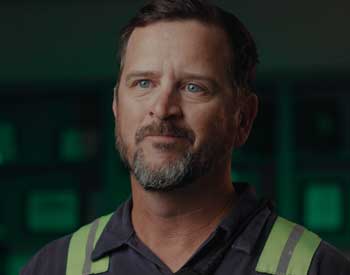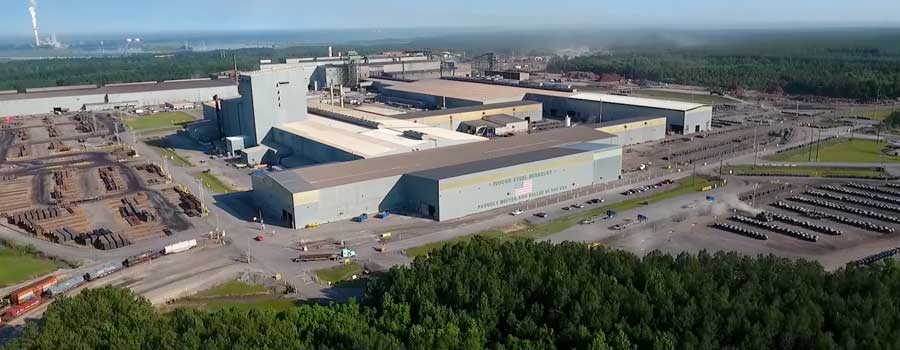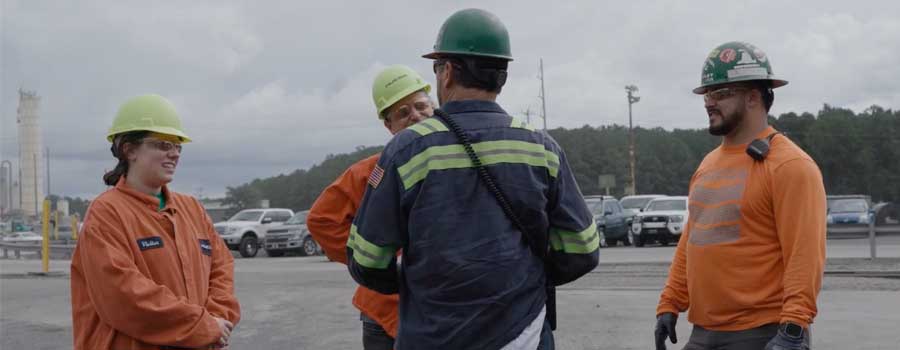At Nucor's 8,000-acre campus in Berkeley County, South Carolina, massive cranes oversee the transformation of molten steel into structural beams and coiled sheet products. However, for Brandon Hulse, Network Manager at North America's largest steel producer, the primary focus isn't on the steel itself, but on the people.
"Safety is our number one value at Nucor," said Hulse, who oversees network operations across more than 300 Nucor locations. "We want to make sure that every teammate is able to go home at the end of the day."
Nucor employees embody this commitment, wearing photos of their families on their hard hats as daily reminders of why they must return home safe and sound each night. Paul Godolphin, Nucor Network Engineer, puts it simply: "Everything is about safety, and we make money in between."
Guaranteeing this level of protection across Nucor's vast outdoor operations, where 27 miles of railroad track wind through the facility and 400 to 500 rail cars move materials daily at just one site, was not always straightforward. It required solving a critical connectivity challenge that traditional wireless networks couldn't address.

Spotty coverage was creating safety gaps in Nucor's operations
Nucor's massive scale presented connectivity challenges that threatened both worker safety and operational continuity. The company's Berkeley facility alone spans roughly five square miles of developed land, with trains constantly moving through 30 rail crossings and loading 200 trucks between sheet and beam operations.
"Previously, our wireless infrastructure was set up with about 65 wireless access points spread across the yard and the outside areas, but that only covered about 50 to 60% of the outside area," Hulse said. "We still had lots of dead zones and plenty of issues trying to connect trailers and rail cars to the internet."
The resulting coverage gaps created unacceptable safety risks. Nucor leadership issued a "red line" safety mandate, meaning teammates could no longer ride on rail cars during operations. To enforce this mandate, the company needed cameras on trains to maintain visibility for operators. But the existing Wi-Fi infrastructure couldn't support reliable video feeds across the sprawling outdoor environment.
"We need to know exactly what's out in front of our trains," explained Todd Jordan, Nucor Shipping Supervisor. "If there's any buffering or any delay and the picture shows it's clear when it's not, then we could have a serious issue."
Nucor recognized the stakes were enormous. Production interruptions from connectivity failures cost approximately $500,000 per hour, sometimes extending to a full day of lost production. Beyond the financial impact, inconsistent connectivity meant maintenance teams couldn't reliably track mobile equipment, and emergency responders struggled to coordinate in remote areas of the facility.

Everything is about safety, and we make money in between.
Paul Godolphin, Network Engineer, Nucor Berkeley
Verizon Private Wireless Network rapidly improved operational connectivity
Nucor partnered with Verizon to deploy a private wireless network (PWN) that would significantly reduce coverage gaps and support the company's safety-first culture. The solution combined Nokia LTE technology with Verizon's managed services to create a secure, redundant network specifically designed for industrial environments.
"From the time we set up the first appointment to installing units, it probably didn't take three weeks," said Jordan. "The process went pretty smoothly. Very professional. We had team meetings every week until the job got completed."
Verizon engineers conducted detailed site surveys, creating precise designs for optimal LTE radio placement. They strategically positioned radios on existing tall structures, including water towers and a roughly 220-foot galvanizing line, to increase coverage while reducing infrastructure requirements.
Cameras were installed on rail cars to stream low-latency video feeds to operators, enabling safe remote operation. "We were able to put cameras at the front and the rear of the train to help give us that visual of where the train is going instead of having a teammate on the front or the rear of the train, which could be a potential safety hazard," Jordan added.
Nucor's operational data now receives a higher standard of protection. Nucor's private wireless network gives the company complete control over its connectivity to support its inventory scanners.


This private wireless network has been able to help us be more efficient in getting tons shipped and getting inventory stored.
Todd Jordan, Beam Mill Shipping Supervisor, Nucor Berkeley
Wireless network modernization forges major safety and efficiency gains
This modern wireless network architecture enabled striking efficiency gains and substantial safety improvements. "Cutting 65 wireless access points down to only seven radios and going from 50% coverage to 100% coverage was a really good win for us," Hulse said.
Nucor's safety operations immediately benefited from superior connectivity. Rail operators can now monitor train movements through near real-time camera feeds to protect their teammates. Emergency response dispatchers can track personnel locations across the entire facility, even in previously unreachable areas.
Operational efficiency dramatically improved, too. Mobile equipment operators no longer experience the connectivity drops that previously caused costly production delays. Inventory management is more reliable because scanners can now maintain consistent connections throughout the facility.
"This private wireless network has been able to help us be more efficient in getting tons shipped and getting inventory stored," Jordan explained.
During the few instances when equipment required attention, Verizon's prompt response impressed the team. "We had our first two radios go down at 5:30pm on a Friday; they responded quickly, and we were back up within a couple of hours," Jordan recalled.


Cutting 65 wireless access points down to only seven radios and going from 50% coverage to 100% coverage was a really good win for us.
Brandon Hulse, Network Manager, Nucor Business Technology
Reliable network performance provides peace of mind
This wireless network transformation touches every corner of Nucor's operations, but for Godolphin, the change feels deeply personal. It's about peace of mind, especially when it comes to worker safety.
"As you drive out, there's a sign 'be careful because there's someone waiting for you at home.' That's really the governing philosophy of the company," said Godolphin.
As Nucor considers expanding private wireless network capabilities to additional facilities to help every teammate return home unharmed each day, it's making steady progress toward its ultimate goal of becoming the safest steel company in the world.

Learn more
Private Wireless Networks
Adapt in real time, improve productivity, and power innovation—all with flexible, secure network connectivity.
Customer success story
See how Binsky & Snyder is getting reliable coverage at its new 130,000 square foot manufacturing warehouse facility with a flexible Verizon Private Wireless Network.